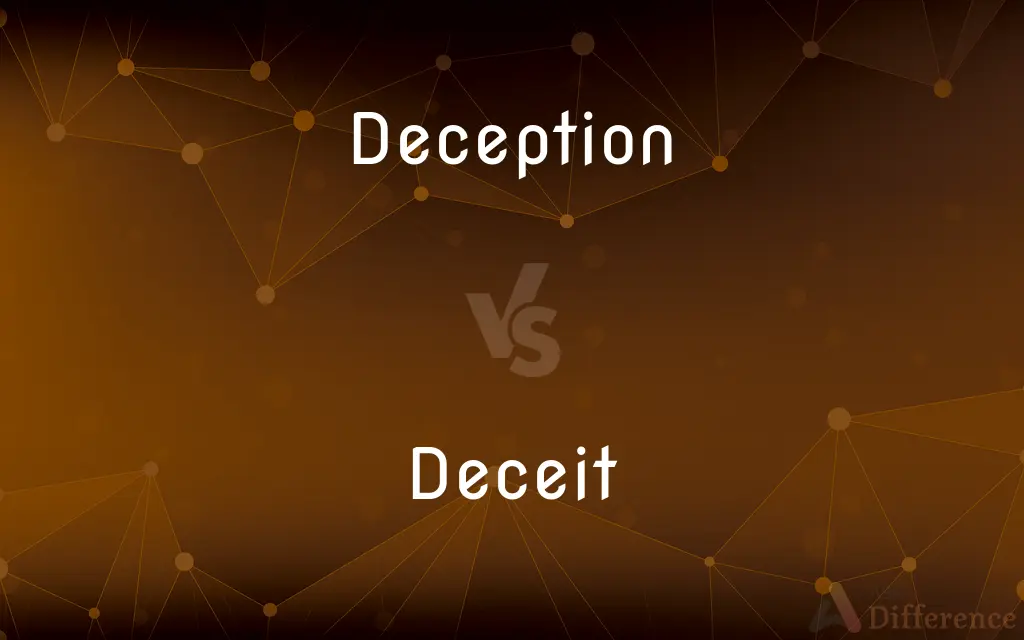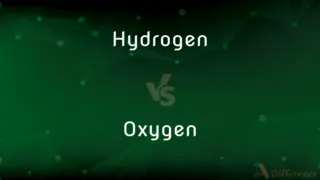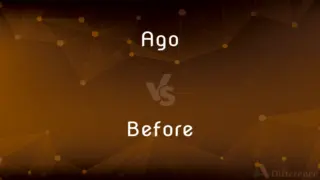Deception vs. Deceit — What's the Difference?
By Tayyaba Rehman — Published on August 27, 2023
Deception refers to the act of misleading someone, while deceit is the quality or habit of being deceptive. Deception is generally an action, and deceit is a character trait or disposition.

Difference Between Deception and Deceit
Table of Contents
ADVERTISEMENT
Key Differences
Deception and deceit are words commonly used interchangeably, but they have distinct nuances. Deception focuses on the act of making someone believe something that isn't true. For example, a magician's trick can be a form of deception. Deceit, on the other hand, is more about the intention or tendency to deceive, and it often has a negative connotation.
Deception can be benign or even entertaining, as in the case of magic shows or surprise parties. In these instances, the deception serves a specific purpose but doesn't inherently reflect negatively on one's character. Deceit, however, usually implies a level of dishonesty that is morally questionable, implying a predisposition to deceive.
In a legal context, deception may refer to specific instances or acts that led someone to believe something false. It is often something you can pinpoint and describe. Deceit, conversely, might be used to describe a person's overall character or intention throughout a series of events, which makes it more abstract.
Deception is more about the act or the event where misleading occurs. Deceit is more like a character trait or a consistent pattern of deceptive behavior. Both can overlap but are different in focus—one on action and the other on intention.
Comparison Chart
Focus
Act of misleading
Tendency to deceive
ADVERTISEMENT
Connotation
Neutral or Negative
Mostly Negative
Temporality
Specific Instances
Prolonged or Consistent
Legal Usage
Describes acts
Describes character
Versatility
Can be benign
Usually morally questionable
Compare with Definitions
Deception
The act of causing someone to believe something that is not true.
His deception fooled everyone into thinking he was a doctor.
Deceit
The quality of being dishonest or deceptive.
His deceit was revealed when they found out he had lied.
Deception
A misleading or untrue idea or belief.
The notion that the world is flat is a deception.
Deceit
Intentional misleading or trickery.
The scam was an elaborate form of deceit.
Deception
A trick or scheme used to get what you want.
She used deception to win the game.
Deceit
A lie or falsehood.
The story was a deceit meant to cover up the truth.
Deception
Intentional misrepresentation of facts.
His resume was filled with deceptions about his experience.
Deceit
An act of deceiving someone.
Deception
The use of deceit.
Deceit
Untrustworthy character or behavior.
She eventually saw through his deceit.
Deception
A ruse; a trick.
Deceit
The act or practice of deceiving; deception.
Deception
The fact or state of being deceived.
Deceit
An act or practice intended to deceive; a trick.
The whole conversation was merely a deceit.
Deception
An instance of actions and/or schemes fabricated to mislead someone into believing a lie or inaccuracy.
Deceit
The action or practice of deceiving someone by concealing or misrepresenting the truth
A web of deceit
A series of lies and deceits
Hypocrisy and deceit were anathema to her
Deception
The state of being deceived or misled.
There is one thing relating either to the action or enjoyments of man in which he is not liable to deception.
Deceit
A stratagem; a trick.
Deception
A misleading falsehood
Deceit
The quality of being deceitful; falseness.
Deception
The act of deceiving or misleading.
Deceit
(uncountable) The state of being deceitful or deceptive.
Deception
That which deceives or is intended to deceive; false representation; artifice; cheat; fraud.
There was of course room for vast deception.
Deceit
(law) The tort or fraudulent representation of a material fact made with knowledge of its falsity, or recklessly, or without reasonable grounds for believing its truth and with intent to induce reliance on it; the plaintiff justifiably relies on the deception, to his injury.
Deception
Deception or falsehood is an act or statement which misleads, hides the truth, or promotes a belief, concept, or idea that is not true. It is often done for personal gain or advantage.
Deceit
An attempt or disposition to deceive or lead into error; any declaration, artifice, or practice, which misleads another, or causes him to believe what is false; a contrivance to entrap; deception; a wily device; fraud.
Making the ephah small and the shekel great, and falsifying the balances by deceit.
Friendly to man, far from deceit or guile.
Yet still we hug the dear deceit.
Deception
The act of deceiving
Deceit
Any trick, collusion, contrivance, false representation, or underhand practice, used to defraud another. When injury is thereby effected, an action of deceit, as it called, lies for compensation.
Deception
An illusory feat; considered magical by naive observers
Deceit
The quality of being fraudulent
Deception
Any form of disguise or pretense.
The spy used deception to infiltrate the organization.
Deceit
A misleading falsehood
Deceit
The act of deceiving
Deceit
A dishonest act or statement.
He was caught in a deceit when he claimed to be someone else.
Common Curiosities
Can you be charged for deception?
In a legal context, specific acts of deception can lead to charges like fraud.
Is deception always negative?
No, deception can sometimes serve a benign or positive purpose, such as in magic tricks or surprise parties.
Is deceit always deliberate?
Deceit usually implies intentional misleading or dishonesty.
Can deception be used for good?
Deception can be used for good in some cases, such as deceiving an enemy in wartime for a strategic advantage.
Is deceit considered a trait?
Yes, deceit is generally considered a character trait or a tendency to deceive.
Can deception be a single event?
Yes, deception often refers to specific instances or acts of misleading.
Is deceit more premeditated?
Deceit usually implies a level of premeditation and ongoing dishonest behavior.
Can deceit exist in a relationship?
Yes, deceit can exist in relationships and often involves dishonesty or betrayal.
Is deception the same as lying?
Deception involves misleading someone but it's not always through lying; it can be done through omission or manipulation as well.
Is deceit inherently bad?
Deceit generally carries a negative moral connotation and is often seen as inherently bad.
Can you give an example of deception in daily life?
Telling someone you're fine when you're not could be considered a form of deception.
How do psychologists view deceit?
Psychologists may study deceit as a personality trait, examining how it impacts relationships and social interactions.
Can deceit be an overarching theme in a story?
Yes, deceit can be used as an overarching theme to describe a character's actions throughout a narrative.
Is deceit always long-term?
Deceit often implies a prolonged or consistent pattern of deceptive behavior.
Is deception more factual?
Deception often involves specific, identifiable acts, making it more factual in nature.
Is deceit more abstract?
Deceit is often more abstract, focusing on the quality or tendency to deceive rather than specific acts.
How does deception relate to disguise?
Deception can involve disguise or pretense to mislead someone, like an undercover agent adopting a false identity.
Does deceit have to involve lying?
Deceit generally involves lying or dishonesty, though it can also include actions meant to mislead.
How do psychologists view deception?
Psychologists may study deception as a social or cognitive phenomenon, often exploring why people deceive and how they react to being deceived.
Is deception always conscious?
Deception usually involves a conscious decision to mislead or create a false impression.
Share Your Discovery

Previous Comparison
Hydrogen vs. Oxygen
Next Comparison
Ago vs. BeforeAuthor Spotlight
Written by
Tayyaba RehmanTayyaba Rehman is a distinguished writer, currently serving as a primary contributor to askdifference.com. As a researcher in semantics and etymology, Tayyaba's passion for the complexity of languages and their distinctions has found a perfect home on the platform. Tayyaba delves into the intricacies of language, distinguishing between commonly confused words and phrases, thereby providing clarity for readers worldwide.
















































